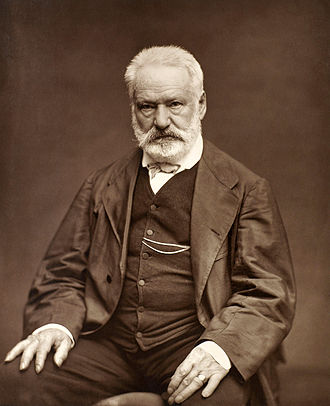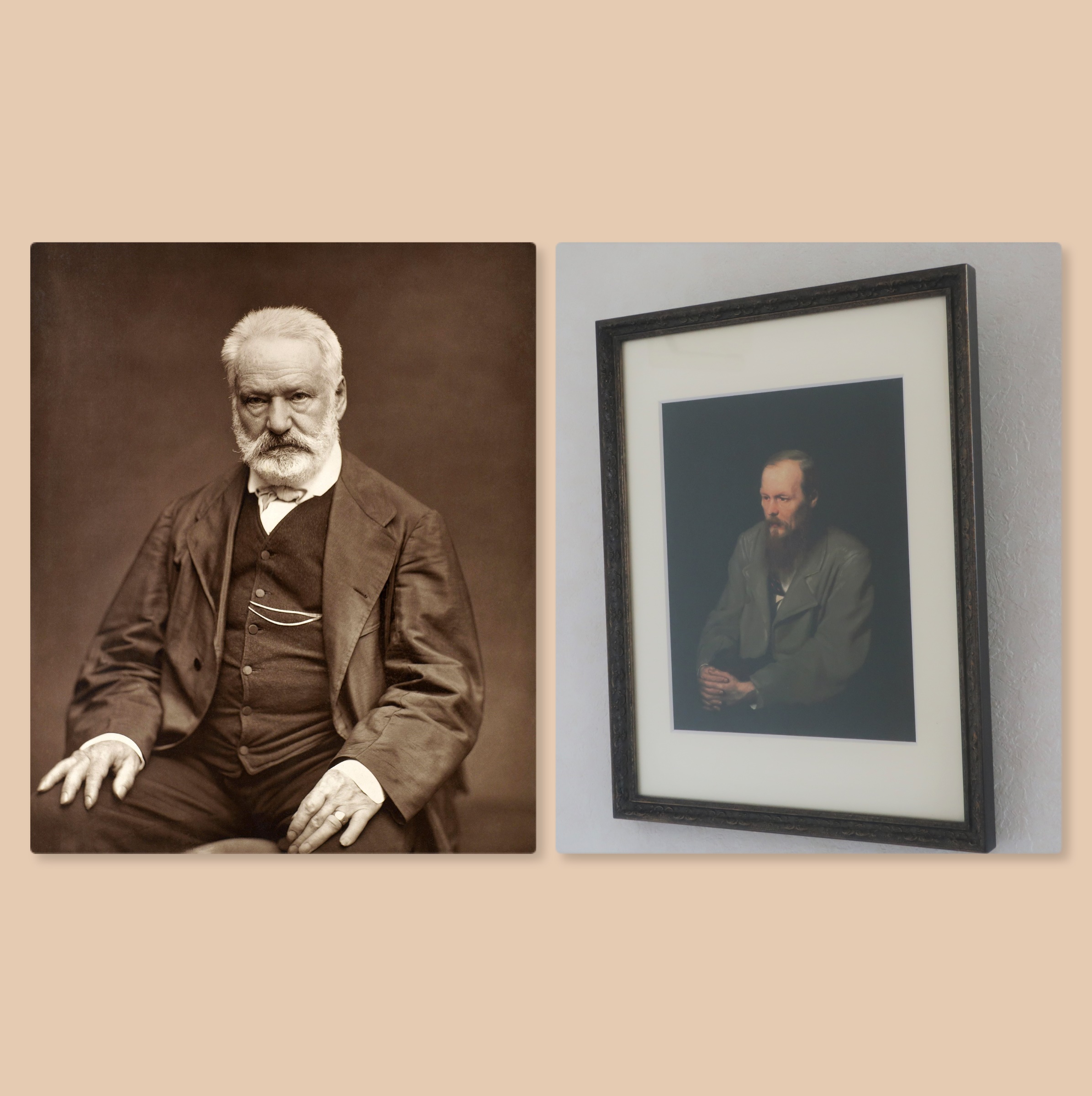Victor Hugo and Dostoevsky

Victor Hugo, born in 1802 to a Napoleonic soldier and the daughter of a royalist in Nantes, France, was a leading French writer who was buried in the Panthéon in Paris in a state funeral in 1885.
Shigeru Kashima, a French literature scholar.One Hundred and Six Scenes from "Les Miserables"In the afterword to the book, Hugo is described as follows.
Victor Hugo is known in Japan only as the author of "Les Miserables," but in France, as is evident from the fact that every country town has a street named after him, he was a great national poet, the father of the Republic, and in some ways a national symbol more widely familiar to the people than Napoleon. In a sense, he is a national symbol more widely loved by the people than Napoleon.
Shigeru Kashima, "Les Miserables" One Hundred and Six Views, p. 488
In Japan, Hugo is famous for "Les Miserables," but in France, Hugo is known as a great poet and a leader who lived through the turbulent times of France.
As his state funeral in the Pantheon shows, he was more than just a writer; he was a respected representative of France.
Hugo's relationship with Dostoevsky
So, what is the relationship between this leading French great and Dostoevsky?
The most famous episode can be found in Dostoevsky's first trip to Europe in 1862.
In 1862, at the age of 41, Dostoevsky embarked on his first trip to Europe. Joining him halfway through the trip was a friend named Straakhov, who appears in the following quote.
For Dostoevsky, traveling to Europe has long been a dream trip.
But his behavior in that longed-for place was unusual.
According to Straakhov, "Dostoevsky was never a skillful traveler. Neither nature nor historical monuments, not even works of art, let alone the greatest masterpieces, attracted his attention. His attention was entirely human. His attention was on people, on impressions of the general life of the city, on the nature and character of its people. He was very enthusiastic in telling me that there was no point in walking around with a guide to see the sights, as anyone else would do. In fact, we didn't see anything," he said. Even when we went to Florence, which I had admired since my youth, "we didn't do anything that travelers do. Apart from strolling around the city, we read a lot. At the time, "Les Misérables" by Yugowo had just come out, and Dostoevsky bought each volume one after the other, handing them to me when he finished reading them.
The Life of Dostoevsky" Kobayashi Hideo, Shinchosha, published in 2012, 35th printing, p. 122.
When Dostoevsky came all the way to Europe, a place he longed to visit, he didn't try to sightsee at all. He just wanders around the city and observes the people.
And the ultimate act was reading Hugo's "Les Misérables," which had just been released at the time.
This episode shows Dostoevsky's unusual travel style and his love for Hugo.
Dostoevsky had been a fan of Hugo since he was a teenager.
Since it was common for the Russian upper class and cultured people to speak French, Dostoevsky was also familiar with Hugo's works in the original.
Major Japanese works read at that time were novels such as "Notre-Dame de Paris" and "The Last Day on Death Row.
Hugo also published a vast number of other works, including poetry and plays, so Dostoevsky probably read them as well.
Les Misérables, the much-talked-about new novel by this favorite author, Hugo, will be released in Brussels and Paris in 1862.
How delighted Dostoevsky must have been when he came to Europe at that very moment and found the work!
I don't know how long it would take for "Les Miserables" to be released if it were in Russia. Unlike today, it takes a long time for foreign books to arrive. And Russia is a remote place far away from Paris. If I miss this chance to see you in Europe, I don't know when I will see you again...
I imagine that is why Dostoevsky devoured "Les Misérables" even though he was on a longed-for trip to Europe.
Also, twelve years later, in 1874, Dostoevsky was offered a two-day ban by the police department over an article that appeared in the Citizen, of which he was editor-in-chief.
He was imprisoned in the brig of Sennaya Square in Petersburg.
Dostoevsky's wife, Mrs. Anna, described her husband's condition after his imprisonment in "Dostoevsky in Recollection" as follows.
When he returned home, he was in a very good mood and said he had enjoyed the two days very pleasantly. Since his cellmate was a craftsman and slept all day, my husband was able to read Victor Hugo's "Les Misérables" again without being disturbed.
It's a good thing I was imprisoned," he said pleasantly, "because if it hadn't been for this, I wouldn't have been able to renew the wonderful impression I once had of that masterpiece. If it hadn't been for this, I would never have been able to renew the wonderful impression I once had of that masterpiece.
Dostoevsky in Recollection" Anna Dostoevskaya, translated by Hiroshi Matsushita, Misuzu Shobo, p. 70-71
Twelve years after Dostoevsky's first trip to Europe, he was held in a cell because he was imprisoned.
However, even though it was a restraint, it was actually a very lax measure, and Dostoevsky was able to spend his time comfortably.
Perhaps because he knew this in advance, Dostoevsky brought books with him to make the most of his time there.
That was Hugo's Les Misérables.
Dostoevsky has been a devilish reader since his youth.
I think it is very significant that Dostoevsky chose "Les Miserables" out of such a huge number of books.
By this time, Dostoevsky was extremely busy writing, so he was in no condition to take his time and enjoy reading.
Hugo's "Les Misérables" was chosen to accompany him during this time of imprisonment, a precious time when he could relax after a long absence. This episode shows how much he loved this work.
Also, his workThe Moron.Les Misérables" also had a major influence on the characterization of Myshkin, the protagonist of
Please refer to this article, which we have previously introduced, if you are interested in this point.
There are also other Hugo'sThe Last Day on Death Row.is said to have influenced Myshkin's description of death row inmates.
After all, Dostoevsky himself was sentenced to death in 1849 and had been on the verge of death.
Just like Hugo's "Last Days on Death Row," which I read when I was young, I would have never thought then that I would be executed.
Unlike in "The Last Days on Death Row," Dostoevsky was pardoned by the Czar shortly before his execution and exiled to Siberia, an experience he will probably never forget.
Also,Notre-Dame de Paris.In the past, Dostoevsky also translated the book into Russian and published it in a magazine that he and his brother ran in 1862. We will cover this in more detail in a later article.
The relationship between Dostoevsky and Hugo is inseparable. Hugo has greatly influenced Dostoevsky.
From the next article, I will introduce "Les Miserables," "Notre-Dame de Paris," and "The Last Days of the Condemned" and write about my impressions from a Dostoevskian perspective.
The above is "Les Miserables," which Dostoevsky also loved, and the deep relationship between Les Miserables and Dostoevsky.
Next Article.
Related Articles







































